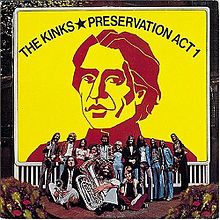Posted on May 16,
2016
Flash Forward To Trump
A warning from a 70s rock opera
by
Daniel
Clark
As much as rock musicians like to yammer about
politics, they are not generally renowned for their political acumen. Once in a long while, however, they’re worth
listening to. Chances are, you’re not
familiar with Preservation, a
two-part rock opera by the Kinks that was released in 1973-74. It was commercially unsuccessful at the time,
largely for reasons endemic to the rock opera format. The pair of albums offered few stand-alone
songs that might have been promoted as singles, and although most of the music
is excellent, it is marred by a handful of embarrassing clunkers, that surely
would not have been included but for the purpose of maintaining the continuity
of the story line. If you’ve had
occasion to listen to it,  though,
it can’t help but have sprung to mind since the start of Donald Trump’s
presidential bid.
though,
it can’t help but have sprung to mind since the start of Donald Trump’s
presidential bid.
Written, as most of the band’s material was, by lead
singer Ray Davies, Preservation centers
around a pair of highly ambitious characters named Mr. Flash and Mr.
Black. The far more compelling character
is Mr. Flash, a flamboyant real estate mogul whose ruthlessness is belied by
his comical appearance and buffoonery.
He has built his empire through political corruption, noting during the
song “Demolition” that “with compulsory purchase, we can buy it up cheap.” That’s a reference to Britain’s version of
eminent domain, which Trump had hoped to persuade the Scottish government to
invoke so he could build a golf resort, in spite of the wishes of the rightful
owners of the desired  properties.
properties.
Mr. Black is a typically grim Marxist with no
charisma, who would stand little chance of rising to power if not for Mr.
Flash’s excesses. Patiently awaiting his
opportunity, he reasons in “When a Solution Comes” that, “Everybody’s searching
so desperately; they’ve got to run to someone, and that someone is gonna be me.”
Regardless of who personifies Mr. Black – whether it’s Hillary Clinton
in this year’s campaign, or else Elizabeth Warren, Bill de Blasio, or somebody
even worse in 2020 – that candidate will likely employ this same tactic, of
simply being the alternative to Trump.
There are some elements of the story that don’t fit
our current situation. For example, Mr.
Flash built himself up from poverty, rather than being a silver-spooner like The Donald.
Mr. Black and his supporters are socially puritanical, which is not
remotely true of today’s Leftists (or much of anyone else, really). Apart from those exceptions, the  parallels
are undeniable.
parallels
are undeniable.
Mr. Flash, who has no ideology apart from himself,
leverages government power to his personal advantage, harbors unconventional
sexual proclivities, deploys goons to rough people up, and treats women badly,
all the while boasting that he’s acting “for the good of the nation.” Mr. Black is privately contemptuous of the
masses to whom he publicly pledges his loyalty.
He aims to swindle them into handing over their nation by promising them
lots of free stuff. Rather than a
chicken in every pot, he declares that “every home will have a stereo and TV, a
deep freeze, quadrasonic, and a washing
machine.” He might as well be speaking
at a Democrat town hall event in Fort Myers.
Mirroring our upcoming general election campaign, this
fictitious power struggle takes place in the absence of anyone advocating a
conservative point of view. Just as
Trump and his Democrat opponents are alike in coveting the levers and switches of
the federal leviathan, Mr. Black and his repeated desire to “build a new
society” echoes Mr. Flash’s scheme to “buy up the towns and knock them all
down; build a brand new world of our own.”
Neither of the combatants in either contest expresses the tiniest interest
in restraining the heavy, freedom-crushing hand of government.
In the end, Mr. Black and his revolutionaries succeed
in overthrowing Mr. Flash’s regime, and they’re ruthless, as one would
expect. In “Artificial Man,” they use
Mr. Flash as a subject for grotesque experimentation, in hopes of creating a superhuman
race (“with the physique of a Tarzan, and the profile of a Cary Grant; a
superior being, totally made by hand”).
When Mr. Black declares victory, he makes no mention
of the guaranteed goodies. To the
contrary, he seizes control of all media, and begins the rationing of food,
water, gasoline and electricity. He also
announces a curfew, violators of which are to suffer “severe penalties” at the
hands of “the People’s Army.”
This announcement leads into the presentation of “our
new national anthem,” an ironic swan song entitled “Salvation Road.” Mocking the chorus from Mr. Flash’s
“Demolition,” it gloats, “Goodbye freedom, hello fear; a Brave New World has
suddenly appeared,” as if to drive home the point that the band does not
actually approve of the outcome.
 The
polemics of Preservation don’t always
hit the mark, as you can tell by listening to a track called “Nobody Gives,”
which blames intransigence for many of the world’s problems, including the
Second World War. (Have you lot on that
side of the pond never heard of Neville Chamberlain?) Nevertheless, it’s hard to dispute the
story’s conclusions, even if one would quibble with its premises. There’s no doubt that Davies is a committed
Leftist, though perhaps not to the degree that he thinks he is. We may deduce that Mr. Flash represents
Davies’ perception of free-marketers, and that the lesson is that the surest
route to left-wing totalitarianism is by way of right-wing, laissez-faire
capitalism.
The
polemics of Preservation don’t always
hit the mark, as you can tell by listening to a track called “Nobody Gives,”
which blames intransigence for many of the world’s problems, including the
Second World War. (Have you lot on that
side of the pond never heard of Neville Chamberlain?) Nevertheless, it’s hard to dispute the
story’s conclusions, even if one would quibble with its premises. There’s no doubt that Davies is a committed
Leftist, though perhaps not to the degree that he thinks he is. We may deduce that Mr. Flash represents
Davies’ perception of free-marketers, and that the lesson is that the surest
route to left-wing totalitarianism is by way of right-wing, laissez-faire
capitalism.
A conservative would argue that the corruption of the
free market by cronyists like Mr. Trump and Mr. Flash
is not capitalism at all, but is instead the subversion of such by a government
that’s already too big and meddlesome.
Alas, perception does not support that reality. Part of the reason we’ve gone this far already is
that capitalism has falsely taken the rap for the federally mandated subprime
mortgage crash. The truth will only
become further obscured once Trump has been established, just as falsely, as
the public face of capitalism.
Not only did Trump support the bailouts that have
aroused such public outrage and distrust, but he even said he would have
approved of nationalizing the banks. He
supported the unconstitutional revocation of property rights in the Kelo v. New London Supreme Court decision,
condescendingly adding, “I don’t think it was explained to most
conservatives.” That ruling expanded the
taking of property for “public use” to include that which is done for “public
purpose,” meaning that the government may transfer private property from one
party to another for less than market value, guided by the belief that the
property would yield more tax revenue if owned by the second party. Conservatives understand it perfectly well,
but thanks anyway Mr. Flash … er, Trump.
Liberals believe Trump is their enemy, and some
conservatives recognize that he’s theirs instead. Meanwhile, those in the apathetic middle will
go wherever the media steer them, which will increasingly be away from the
presumptive Republican nominee. That
leaves a great opportunity for the revolutionary Left to gather support, simply
by being the opposition. Besides, who
doesn’t want a quadrasonic, whatever that is?
The Shinbone: The
Frontier of the Free Press